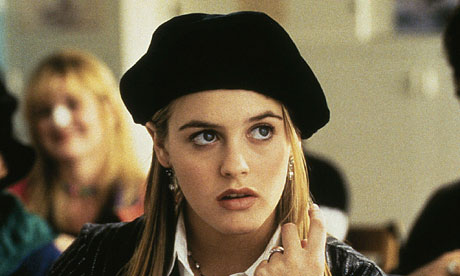PD James and Joanna Trollope's Austen-inspired new books underline the novelist's perennial appeal

Alicia Silverstone in 1995's Clueless, 'which transposed Emma to a California high school'. Photograph: Allstar/Cinetext/Paramount
Jane is back. The news that Joanna Trollope will soon be publishing a contemporary version of Sense and Sensibility had hardly broken before PD James announced Death Comes to Pemberley, a new detective story that will give Pride and Prejudice a heart-stopping, or possibly spine-tingling, sequel.
It gives nothing away to tell you that the year is 1803. Elizabeth Darcy (nee Bennet) and her husband, Fitzwilliam, are getting ready for bed at Pemberley Hall when a carriage rattles up out of a wild night with Lydia Wickham, Elizabeth's younger sister, in hysterics. Her husband, she screams, has been horribly murdered…
Good start, Dame Phyllis. Readers of Pride and Prejudice will not be sorry that caddish Mr Wickham has met a violent end, but now read on... Once again, Jane Austen's work is revealed as the national gift that goes on giving.
The afterlife of Auden's "English spinster of the middle class" is perhaps as surprising as anything in a PD James detective story. A clergyman's daughter, who was first published anonymously and, on one occasion, at her own expense, Austen was admired by the Prince Regent (George IV) and Walter Scott, and her books were generally well-received in her own lifetime, but the Austen cult did not really get underway until the publication of JE Austen-Leigh's A Memoir of Jane Austen in 1870.
Since then, Austen has become a literary brand to rival Shakespeare and Dickens. Her Hampshire home, Chawton, is a shrine that attracts thousands. There is a Pride and Prejudice board game, a couple of books – Jane Austen's Guide to Dating and The Jane Austen Book Club – and a CD of the music Miss Austen might have played or listened to.
In the past 16 years, since Clueless transposed Emma to a California high school, there have been at least seven film and TV adaptations of her work. In the bookshops, Austen's main titles have sold by the million.
Among the many books that make sly homage to Austen, one of the best is Helen Fielding's Bridget Jones's Diary, subsequently a romcom vehicle for Hugh Grant. In 2010, Lynn Shepherd foreshadowed PD James with Murder at Mansfield Park, which does what it says on the tin and turns the home of Sir Thomas Bertram into a crime scene.
Austen's appeal is worldwide, especially in India. Bollywood gave us Bride & Prejudice and the Pakistani novelist Moni Mohsin has published Duty Free, which can be most charitably described as "Emma reworked by a Pakistani Helen Fielding."
Jane-ites, appalled by such sacrilege, might have welcomed Jane Bites Back by Michael Thomas Ford, until they discovered that this has Jane Austen alive and well in New York and doing very nicely – as a vampire.
It gets weirder. In 2009, Pride and Prejudice and Zombies by Seth Grahame-Smith took Austen into a cultish fantasy world where Elizabeth and Darcy have become zombie-hunters at war with the undead.
In such a chamber of horrors, Death Comes to Pemberley will seem almost restful. It is odd to think that, within living memory, Jane-ites have been famously agitated by established novelists daring to rewrite the end of Sanditon, Austen's unfinished novel.
Read McCrum's full piece at The Guardian.
It gives nothing away to tell you that the year is 1803. Elizabeth Darcy (nee Bennet) and her husband, Fitzwilliam, are getting ready for bed at Pemberley Hall when a carriage rattles up out of a wild night with Lydia Wickham, Elizabeth's younger sister, in hysterics. Her husband, she screams, has been horribly murdered…
Good start, Dame Phyllis. Readers of Pride and Prejudice will not be sorry that caddish Mr Wickham has met a violent end, but now read on... Once again, Jane Austen's work is revealed as the national gift that goes on giving.
The afterlife of Auden's "English spinster of the middle class" is perhaps as surprising as anything in a PD James detective story. A clergyman's daughter, who was first published anonymously and, on one occasion, at her own expense, Austen was admired by the Prince Regent (George IV) and Walter Scott, and her books were generally well-received in her own lifetime, but the Austen cult did not really get underway until the publication of JE Austen-Leigh's A Memoir of Jane Austen in 1870.
Since then, Austen has become a literary brand to rival Shakespeare and Dickens. Her Hampshire home, Chawton, is a shrine that attracts thousands. There is a Pride and Prejudice board game, a couple of books – Jane Austen's Guide to Dating and The Jane Austen Book Club – and a CD of the music Miss Austen might have played or listened to.
In the past 16 years, since Clueless transposed Emma to a California high school, there have been at least seven film and TV adaptations of her work. In the bookshops, Austen's main titles have sold by the million.
Among the many books that make sly homage to Austen, one of the best is Helen Fielding's Bridget Jones's Diary, subsequently a romcom vehicle for Hugh Grant. In 2010, Lynn Shepherd foreshadowed PD James with Murder at Mansfield Park, which does what it says on the tin and turns the home of Sir Thomas Bertram into a crime scene.
Austen's appeal is worldwide, especially in India. Bollywood gave us Bride & Prejudice and the Pakistani novelist Moni Mohsin has published Duty Free, which can be most charitably described as "Emma reworked by a Pakistani Helen Fielding."
Jane-ites, appalled by such sacrilege, might have welcomed Jane Bites Back by Michael Thomas Ford, until they discovered that this has Jane Austen alive and well in New York and doing very nicely – as a vampire.
It gets weirder. In 2009, Pride and Prejudice and Zombies by Seth Grahame-Smith took Austen into a cultish fantasy world where Elizabeth and Darcy have become zombie-hunters at war with the undead.
In such a chamber of horrors, Death Comes to Pemberley will seem almost restful. It is odd to think that, within living memory, Jane-ites have been famously agitated by established novelists daring to rewrite the end of Sanditon, Austen's unfinished novel.
Read McCrum's full piece at The Guardian.

No comments:
Post a Comment